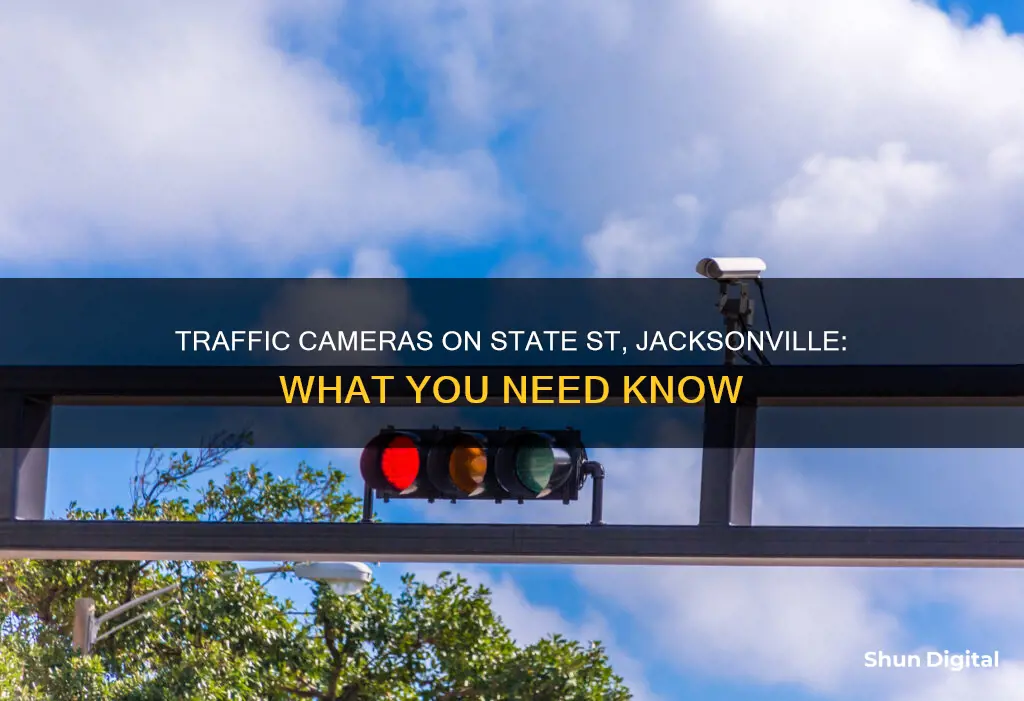
Traffic cameras are a common feature in many cities, and Jacksonville, Florida is no exception. These cameras are typically placed at intersections to monitor traffic flow and enforce traffic rules. While they can be a useful tool for authorities, they have also proven to be controversial, with some questioning their legality and effectiveness. In this regard, State St in Jacksonville has also been equipped with traffic cameras, but do they serve the same purpose as in other cities, and what are the implications for drivers?
What You'll Learn

Jacksonville's red light cameras are controversial
Jacksonville's red light cameras have been a controversial topic. While some people view them as a necessary tool for enforcing traffic controls and maintaining public safety, others have questioned their legality and effectiveness.
Red light cameras are automated systems that monitor intersections and capture images of vehicles that run red lights. These cameras are typically placed on the side or corner of an intersection, and they only take pictures if a vehicle enters the intersection after the light has turned red. If a driver runs a red light, the camera snaps a picture of their license plate and automatically sends a ticket to their address.
The controversy surrounding red light cameras in Jacksonville centres around several key issues. One of the primary concerns is their legality. When these cameras were first introduced, there was significant debate over whether third-party providers, rather than law enforcement, could legally dispense tickets. The matter was escalated to the Florida Supreme Court in 2019, which ruled that the cameras are legal in the interest of public safety.
However, the effectiveness of red light cameras in reducing crashes has been questionable. Local data from Duval County, where the cameras were activated in early 2013, showed mixed results with both increases and decreases in accidents at intersections with cameras. As a result, Sheriff Mike Williams decided not to renew the city's red light camera contract after it expired at the end of 2017. He acknowledged that the statistics didn't definitively prove a reduction in crashes and concluded that the technology needed further improvement.
Another point of contention is the revenue-earning ability of the red light cameras, which fell short of expectations. In addition, some critics view the cameras as "Orwellian threats to freedom", raising concerns about constant video surveillance. On the other hand, proponents of the technology argue that it is crucial for public safety and can help manage traffic flow more efficiently.
While red light cameras continue to be a divisive issue in Jacksonville, the city has taken a cautious approach by evaluating their effectiveness and considering the concerns of its residents. As of 2017, the program was discontinued due to insufficient evidence of its success in reducing accidents. However, with the dynamic nature of technology and public opinion, it remains to be seen whether red light cameras will make a return in the future.
Mastering Manual Focus: A Guide to Shooting Sharp Photos
You may want to see also

Cameras are owned by third-party providers, not law enforcement
In Jacksonville, Florida, there are cameras at some of the red lights, and these have been a source of controversy. Many of these cameras are owned and operated by third-party providers, not law enforcement. When these cameras were first introduced, there were questions about their legality and whether they could dispense tickets in place of law enforcement.
The matter was taken to the Florida Supreme Court in 2019, which ruled that the cameras are legal and can be used in the interest of public safety. Despite this ruling, some communities in Florida have started to phase out the cameras.
The cameras in question are "red light cameras", a tool for enforcing traffic controls at some intersections in Jacksonville. These cameras monitor intersections as traffic lights change, and if a driver runs a red light, a picture of their license plate is taken, and a ticket is automatically sent to their address.
The cameras are selective about when they take pictures. They only take a picture if a car enters an intersection after the light has turned red. If a driver is going through a yellow light, they will not be ticketed. In addition to the picture of the license plate, the cameras also take a picture of the front of the car and a short video, providing extra evidence in case the ticket is contested.
The controversy surrounding these cameras is not unique to Jacksonville. In St. Johns County, there are cameras mounted above traffic signals at several intersections. These are not "red light cameras", and they are used for traffic management, monitoring the flow of vehicles, and triggering signals to change.
Troubleshooting Guide: Lumix Camera Battery Won't Charge
You may want to see also

Tickets cost $158, but vary depending on speed and location
Traffic cameras are present in Jacksonville, Florida, and they are typically installed at intersections to monitor traffic flow and enforce traffic controls. While the presence of these cameras can vary across different streets and intersections, it is important to understand the consequences of receiving a ticket.
In Jacksonville, Florida, the cost of a ticket from a traffic camera, often referred to as a red-light camera ticket, is typically $158. However, it's important to note that the cost of the ticket can vary depending on several factors, including your speed at the time of the violation and the specific county where the infraction occurred.
The ticket cost is generally determined by the county you were in and how fast you were driving. For instance, in most parts of Florida, a red-light camera ticket will result in a standard fine of $158. However, if you fail to pay this fine promptly after receiving the first notification, the cost can increase significantly.
In the case of Jacksonville, if you do not pay the initial $158 fine on time, your ticket cost will surge to $262. Additionally, you will incur points on your driver's license as a penalty for the violation. This can have further implications for your driving record and insurance rates. Therefore, it is crucial to address any tickets promptly and ensure timely payment to avoid these additional consequences.
To avoid receiving a ticket, it is essential to obey traffic signals and be mindful of your speed, especially when approaching intersections. By adhering to traffic rules and regulations, you can help ensure your safety and the safety of other road users, as well as avoid the financial burden of costly tickets and any associated penalties. Remember to stay vigilant and cautious while driving, as the presence of traffic cameras can vary across different locations in Jacksonville, and the cost of a ticket can vary depending on the specifics of the violation.
Explore Lorex Camera Corridor Mode: Maximizing Your Camera's View
You may want to see also

Tickets must be paid within 30 days to avoid fines and points
Traffic cameras are a common sight, and while they can be a helpful tool for enforcing traffic rules, they have also sparked controversy. In Jacksonville, Florida, red light cameras are one of the measures used by the city to maintain public safety. These cameras are positioned at some intersections and are designed to capture images of vehicles that enter the junction after the lights have turned red. If a driver runs a red light, the camera will snap a picture of their license plate, and they will automatically receive a ticket by mail.
The use of these cameras has been a topic of debate, with some questioning the legality of tickets issued by third-party providers rather than law enforcement. However, the Florida Supreme Court ruled in 2019 that these cameras are, in fact, legal. While some Florida communities have started phasing out the cameras, Jacksonville has continued their use.
If a driver receives a red light ticket, it is important to pay the fine within 30 days to avoid additional penalties. The cost of the ticket will depend on various factors, such as speed and location. In most cases, a red light camera ticket in Florida will be $158. Failing to pay the ticket on time will result in a higher fine, typically increasing to $262 in Jacksonville, along with points added to the driver's license.
To pay the ticket, individuals can utilise various methods offered by the relevant authorities, such as online payment systems, phone services, or in-person visits to designated offices. It is crucial to keep in mind that ignoring the ticket for too long could result in further consequences, including the potential loss of one's driving license. In certain situations, individuals may choose to contest the ticket with the help of a lawyer, especially if they believe they received the ticket unjustly.
The Selfie Camera: Why Does Nobody Care?
You may want to see also

Red light cameras are legal according to the Florida Supreme Court
When driving in Jacksonville, Florida, you may notice cameras installed at some of the red lights. These are red light cameras, a tool for enforcing traffic controls at some intersections in the city.
Red light cameras are somewhat controversial. When they were first introduced, there was a lot of debate about whether they could legally issue tickets. Many of these cameras are owned and operated by third-party providers, not law enforcement. Some people questioned if these third-party cameras could dispense tickets in place of the police.
The controversy reached the Florida Supreme Court in 2019. The court ruled that the cameras are legal and can be used in the interest of public safety. However, some communities in Florida have started to phase them out.
Red light cameras are used to monitor intersections. If someone runs a red light, these cameras snap a picture of their license plate and automatically send a ticket to their address. They only take a picture if you enter the intersection after the light has turned red. If you’re driving through a yellow light, you won’t be ticketed. The cameras also take a picture of the front of your car and a short video to provide extra evidence in case the ticket is contested.
In most of Florida, red light camera tickets are $158. In Jacksonville, if you fail to pay your ticket after the first notification, the cost goes up to $262, and points will be added to your driver’s license. If you get a ticket, you’ll receive a notice in the mail. If you don’t plan to contest it, make sure you pay the ticket within thirty days to avoid higher fines and points on your license. If you don’t pay for too long, you could lose your license.
Traffic Cameras in Cedar Rapids: Stay Alert!
You may want to see also







